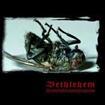 BETHLEHEM Hexakosioihexekontahexaphobia CD (Prophecy Productions) 19.99
BETHLEHEM Hexakosioihexekontahexaphobia CD (Prophecy Productions) 19.99���Long before black metallers everywhere began to embrace and invoke the sounds of 80's era darkwave and post-punk in the manner we've been seeing in recent years, Germany's Bethlehem exuded a uniquely wretched and distressing concoction of crushing doom, unhinged black metal, and utterly morbid gothic filth on early albums like Dictius Te Necare and Sardonischer Untergang Im Zeichen Irreligi�ser. Those early records sounded like little else at the time, and still stick out like a black, throbbing growth amongst the 90's black metal hordes. With their bizarre vocal delivery that often seemed to break down into weeping despair, the strange atmospheric touches and avant-garde arrangements, driving Joy Division-esque bass lines coexisting with spectacularly grim mid-paced black metal riffs, and an overwhelmingly oppressive obsession with suicide and death, Bethlehem almost single-handedly formed the template for much of what people now refer to as "depressive" black metal. Bethlehem would eventually move into more industrial-tinged territory in later years, but there's always been a morbid weirdness that's followed their music, even into the strange blend of gothic metal and Rammstein-esque bombast that comprised their 2004 album Mein Weg, which was actually the last proper full length from the band up till now, their ill-received re-working of Sardonischer from 2009 notwithstanding.
��� With its glossolalia-like title (which means a fear of the number 666), Hexakosioihexekontahexaphobia is the long-awaited return from these Teutonic gloom-mongers, and while this twelve-song album is no return to the razor-wielding suicide-obsessed black metal of those iconic early Lps, this is still some uniquely demented stuff that I found highly enjoyable. Hex kicks off with the band in total Teutonic Sisters Of Mercy mode via the driving, high-gloss goth rock of "Ein Kettenwolf Greint 13:11-18", a track of super-slick, hard rocking stadium-goth that serves up equal helpings of brooding darkness and anthemic fist-shaking choruses, which they follow with the more propulsive, lush gloom-pop of "Egon Erwin's Mongo-Mumu ". Like the latter-day Katatonia stuff, these songs still retain a hefty amount of metallic bite and plenty of grim atmosphere, and the songs that follow delve more than once into Bethlehem's signature dismal slow-moving doom. For the most part, though, the first few songs on Hex are slick, modern post-punk through and through, heavy and ominous and very, very catchy, with lots of driving Peter Hook-style bass lines and lushly cascading guitars, the singer's crooning baritone dominating the mix. At least till "Verbracht In Plastiknacht", where things suddenly turn much more twisted and grotesque, the band finally slipping into jagged, goth-infested blackened heaviness, blasts of mid-paced doom-laden metal laced with peculiar electronic flourishes and industrial rhythms that drift in and out of the evil, lurching crush. It's a pretty varied album, actually: you get the bluesy, heavy instrumental "H�chst Alberner Wichs" with its almost Cult-esque vibe, and gorgeous slide-guitar twang appears on a couple of tracks, as do forays into Rammstein-esque industrial crunch. Other songs are haunting synth-heavy gloomscapes, laced with hints of dark shadowdraped pop and stirring vocal harmonies. An odd mix of sounds for sure, Germanic industrial metal fusing with gorgeous modern darkwave, Lifelover-esque hooks tangling with snarling black doom, with the occasional blast of frenzied black metal a la "Spontaner Freitod". The harshly guttural quality of the German language lyrics mix nicely with the emotional singing style, delivering an unusual combination of gnarled gloompop and sickly blackened dissonance, and while far more experimental than the band's earlier works, it still retains all of the stinking morbidity and suffocating despair that has always been Bethlehem's rot-soaked calling card. Purists should avoid, but for myself, I haven't been able to stop listening to this album.
��� Comes in digipack packaging.
Sample :
Sample :

